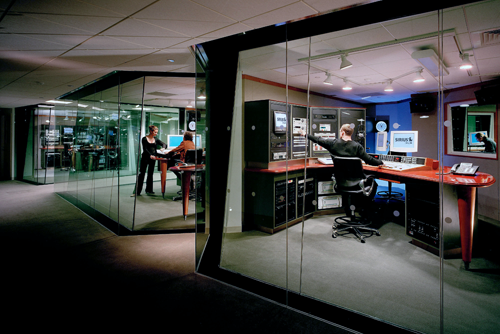JV: Do you have some basic production dos and don’ts that you lay out for the producers with respect to the processing they use on their individual pieces?
Mitch: Well, we do try not to overdo it with compression, but it all depends on the format and the promo itself, and the specific channel. All that comes into play. It’s basically the same as with any other piece of production, whether you’re cutting a record, or whether you’re cutting a promo for FM radio; you try to keep it clean, intelligible, and whatever processing that you use, we try to keep it suitable for what the end use is going to be.
Predominately, we have grown out of using outboard gear. We have Pro Tools in every room. Virtually whatever plug-in a producer might want, we’ll get it for him. Obviously, as the Director, I monitor the use of that so that producers aren’t going a little too crazy or doing anything that’s going to degrade the sound once it gets on the air. But it’s pretty much wide open as far as what they can do creatively.

JV: Describe the typical production studio there.
Mitch: We run all Macintosh computers on the Pro Tools rigs. We have everything from TDM systems down to the 002s, depending on the room. And now the processors on the Macs are getting so powerful these days, and although the 002 is a fine setup, in our higher end rooms we’re also running the Pro Controls. I like producers to have a human user interface, some tactile knobs they grab onto. We run Genelec monitors throughout the house, for a standard reference. All studios have Genelec so we have consistent monitoring, and we use Neumann microphones in all the rooms. We do try to keep them as uniform as possible, but we’re a growing and expanding facility and I’m always looking out for better, newer technology.
JV: Obviously there is competition between Sirius and XM in the struggle to get more subscribers, but it seems that in terrestrial radio, programming is the main weapon in the battle. Listeners can come and go with the touch of a button. Whereas in the satellite domain, it’s a much bigger thing to become a subscriber or to cancel your subscription to go with the competition. It seems the battle is more a battle of marketing. What is the sense of competition in your department between Sirius and XM?
Mitch: Well, obviously, it’s a multi-faceted component here. Regarding the marketing aspect of it, it’s not really in my domain. I know that some of my producers subscribe to XM. I have an XM receiver, too. I like to keep an ear to what they’re doing, and of course I listen to terrestrial radio as well. But, we really try not to let that influence what we’re doing. We really kind of march to our own beat and try not to let that influence us. We work very closely with the producers. We work very closely with the programmers. We first get their vision for the specific channels that we’re imaging, then we just go for it.
JV: What’s up and coming from Sirius? What can the subscriber look forward to that they’re not getting now?
Mitch: Obviously, we’re always going to have things in the pipeline. Everyone in radio knows by now that Howard Stern’s coming in 2006. We’ve got Martha Stewart Living ready to roll shortly. We have a lot of our own unique original programming, which we’re continuing to build. It kind of harkens back to what you were just talking about with competition. We really don’t look at XM as our competition. We look at the whole. Every medium is our competition, be it CDs, terrestrial radio, you name it. Anything that is vying for listener’s attention is our competition. We try to offer such a wide, diverse array of programming that we feel we cover a pretty wide ground.
JV: I’ll be this is the most fun job you’ve had?
Mitch: Without a doubt, without a doubt. Long live Sirius, and this is where I plan on retiring. In fact, I don’t want to retire.
♦
